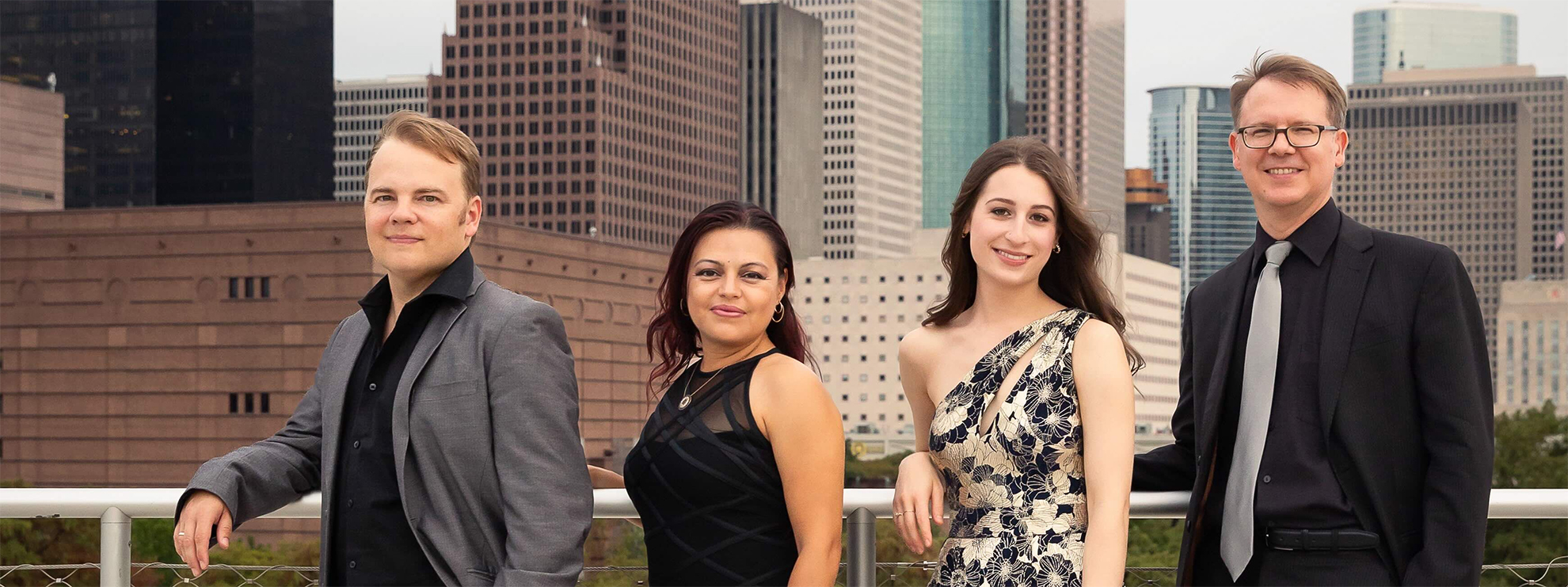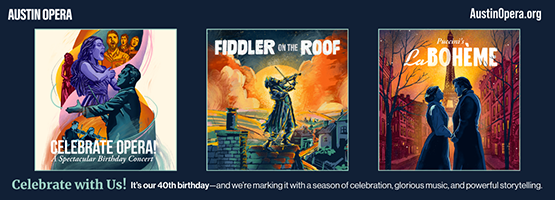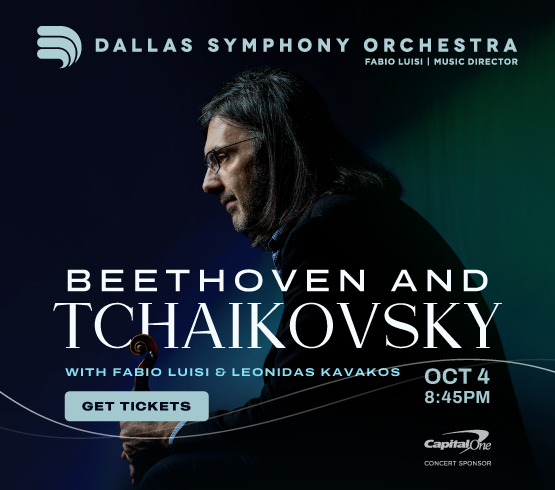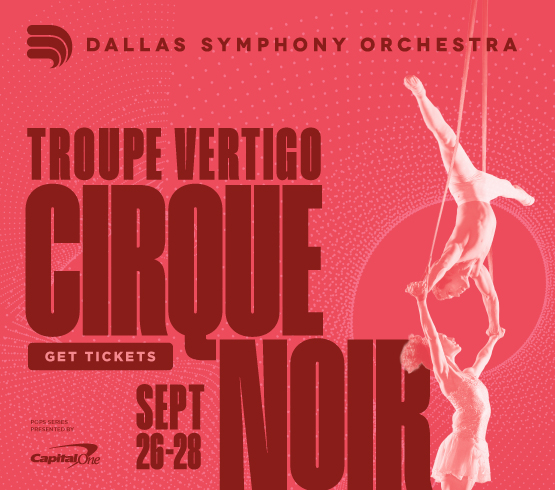Houston’s Apollo Chamber Players have received plenty of media attention, but this was different. Rather than focusing on a single upcoming concert, NPR’s Weekend Edition spotlighted Apollo for building its entire season around real-world events.
NPR’s report was “a news story. It wasn’t just, ‘This is a great group and it’s playing music,’” recalls Matthew Detrick, violinist and co-founder of Apollo. “I was particularly proud of that, and it gave us the confidence to move forward with a season like … ‘We the People.’”
That’s Apollo’s label for 2024-25. As you might guess from the nod to the U.S. Constitution, the concerts will spotlight American ideals such as liberty and democracy, as evoked by an array of composers and writers. Even Houston teenagers will have their say. The season will open as a tumultuous election campaign nears its climax.
For Apollo’s opening concert (Oct. 5), veteran composer John Corigliano has recast his One Sweet Morning, a song cycle for singer and orchestra, to give the instrumental side to a string quintet. Written to commemorate the 10th anniversary of the 9/11 attacks, One Sweet Morning draws on writers from Homer to Hollywood lyricist E.Y. “Yip” Harburg to envision a world that faces and overcomes strife.
In the cycle’s finale, Harburg’s poetry helps conjure up a future in which “the rose will rise…spring will bloom…peace will come….one sweet morning.” While the songs originally featured a mezzo-soprano, the vocal part will here be taken over by countertenor John Holiday, a Houston native who has gone from TV’s “The Voice” to perform with the Metropolitan Opera and other leading companies.
The concert will also recall a lapse in American ideals: the forcing of thousands of Japanese-Americans into internment camps during World War II. Apollo will bring back one of last season’s premieres, Marty Regan’s The Book of Names, in an expanded version incorporating narration written and delivered by actor George Takei. Yes, the Star Trek veteran—who spent part of his youth locked into a camp with his family—will join Apollo to recall the experience and its lessons.
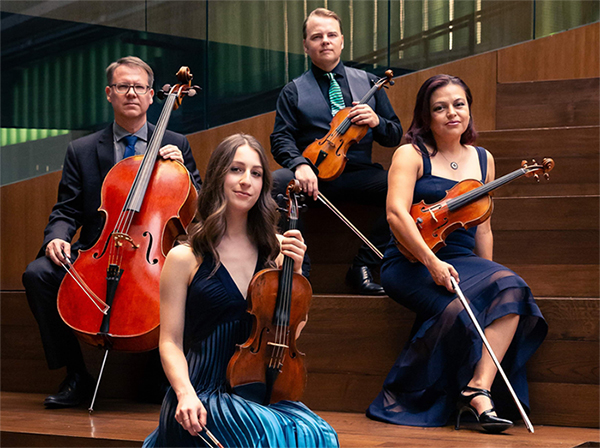
1 ⁄7
Apollo Chamber Players Matthew Dudzik, Aria Cheregosha, Matthew J. Detrick and Anabel Ramírez. Photo by Lynn Lane.
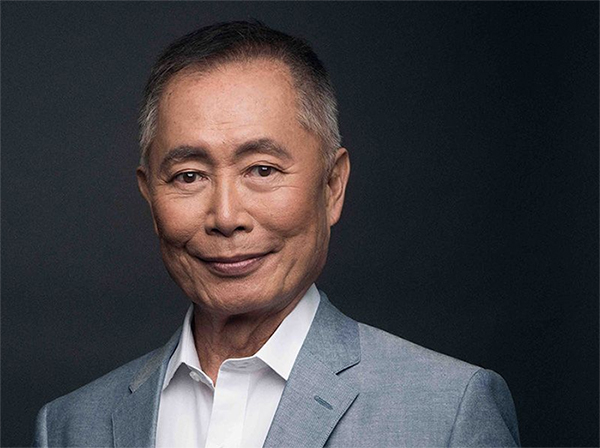
2 ⁄7
George Takei; Photo courtesy of George Takei.
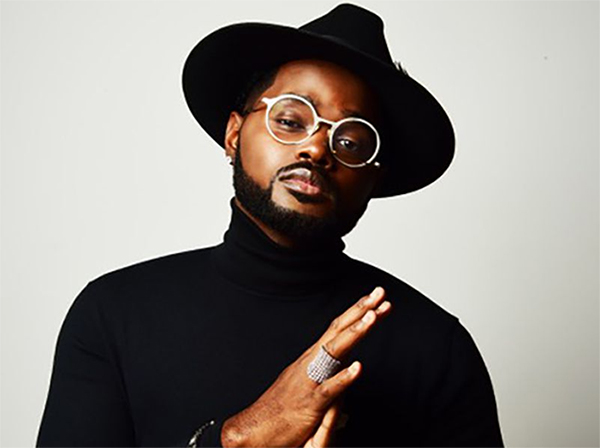
3⁄ 7
John Holiday; photo by Shervin Lainez.
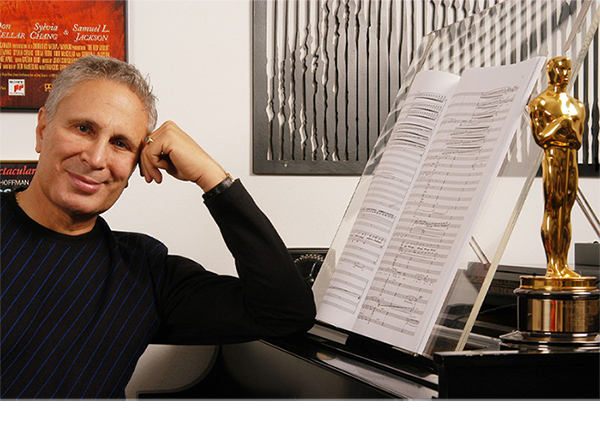
4 ⁄7
Composer John Corigliano; photo courtesy of the artist.
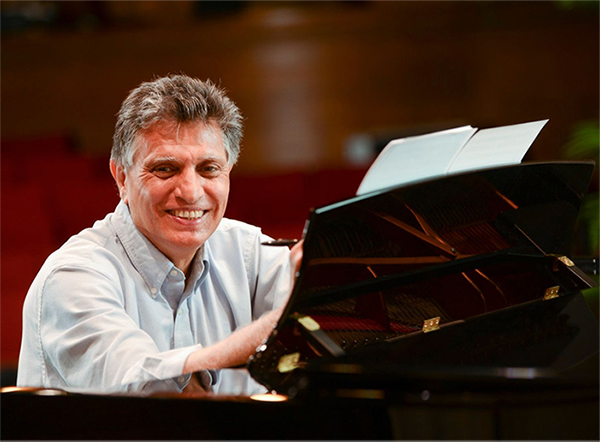
5 ⁄7
Composer Reza Vali; photo courtesy of the artist.
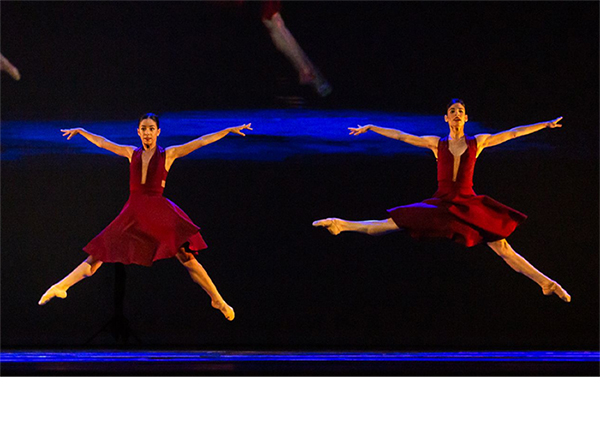
6 ⁄7
Houston Ballet dancers Monica Gomez and Estheysis Menendez. Photo by Lynn Lane.
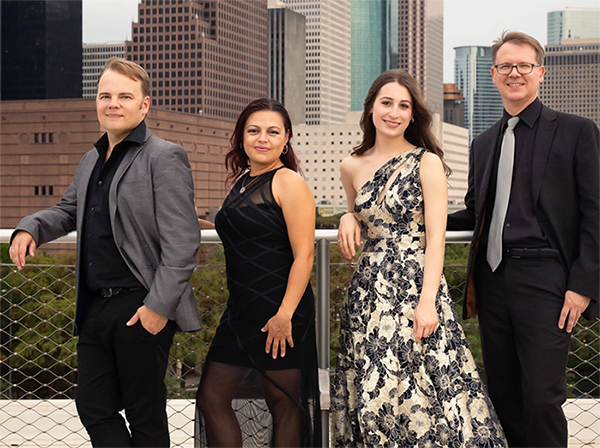
7 ⁄7
Apollo Chamber Players Matthew J. Detrick, Anabel Ramírez, Aria Cheregosha and Matthew Dudzik. Photo by Lynn Lane.
He goes on to recall the 1980s campaign to win restitution for the camps’ survivors, ultimately signed into law by President Ronald Reagan. “Our democracy,” Takei says, “is a precious ideal that requires all of us, as Americans, to actively engage with it to keep it strong and true and shining.”
Apollo’s second program (Jan. 4) will spotlight composers who have come to the United States seeking refuge or opportunity. “We’re all immigrants in some way, whether we’re first generation or fifth generation,” Detrick says.
Many concertgoers may not realize that English icon Benjamin Britten came to the United States as World War II battered his homeland. Britten’s string quartets are “amazing and tough,” Detrick says, and Apollo will play the second. Britten returned home, but Apollo will complement his example with a sonata by a war refugee who stayed here: Hungarian-born Miklós Rózsa, who settled in Hollywood and became a mainstay of Golden Age movie scores.
Nostalgia de las Montañas, one of Apollo’s 20×2020 commissions, is especially “apt for choreography,” Detrick notes, thanks to its varied moods and shifting rhythms. He adds that dancers Gómez and Menendez may have seemed very young when they first collaborated with Apollo several years ago, but now “they’re in a very different place. They’re mentoring others.” He delights in that. Gómez will also choreograph a Cuban classic, Ernesto Lecuona’s Canto Siboney.
In honor of Houston’s famously multicultural population, Apollo’s third program (March 21) will celebrate diversity. Daniel Bernard Roumain, a Haitian-American violinist and composer sometimes known simply as DBR, celebrates civil rights icon Rosa Parks in his String Quartet No. 5. “He’s a really important Black voice in the classical music world,” Detrick says, “and we have not played any of his music.” Obviously, that’s about to change.
The March program will include the premiere of another in Apollo’s extensive series of commissions:Bandari, by Iranian-American composer Reza Vali. A longtime composition teacher at Carnegie Mellon University in Pittsburgh, Vali explains in his program note that the title refers to a musical genre associated with the Persian Gulf port of Bushehr. He likens the city to New Orleans as a cultural melting pot.
Vali’s Bandari will feature Iranian-born percussionist Pejman Hadadi, who first collaborated with Apollo virtually during the pandemic. Meanwhile, the music will keep Apollo’s musicians extra busy, singing and playing percussion instruments in addition to their regular roles. “I had so much fun writing this piece,” Vali says in his note.
Apollo will round out the March program by reprising two past commissions: Lullaby for the Children of the Sun, by Palestinian composer Muyassar Kurdi and Three Goat Blues, by Israeli Gilad Cohen. The two works “stand on their own as pieces,” Detrick says, but their pairing has a purpose. Diversity, Detrick notes, takes more forms than national or ethnic ones.
“I don’t want to make this about the war in Gaza,” Detrick says. “But I do think it’s reflective of why it’s important to have diversity of thought in a society, even when people disagree—especially when people disagree.”
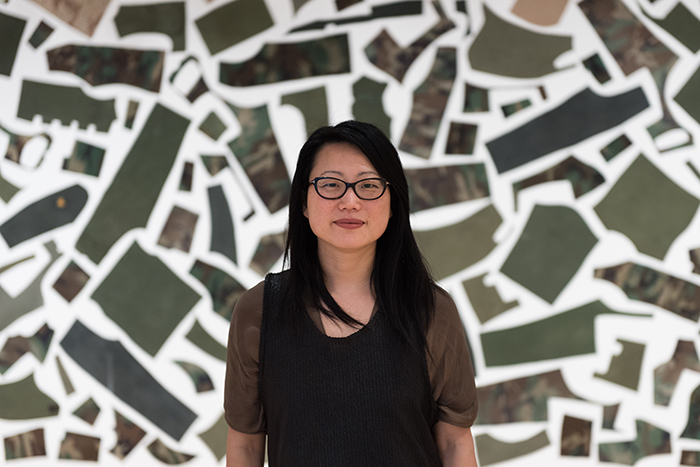
1 ⁄4
Portrait of Jean Shin, Courtesy the artist and Philadelphia Museum of Art, Photo by Joseph Hu
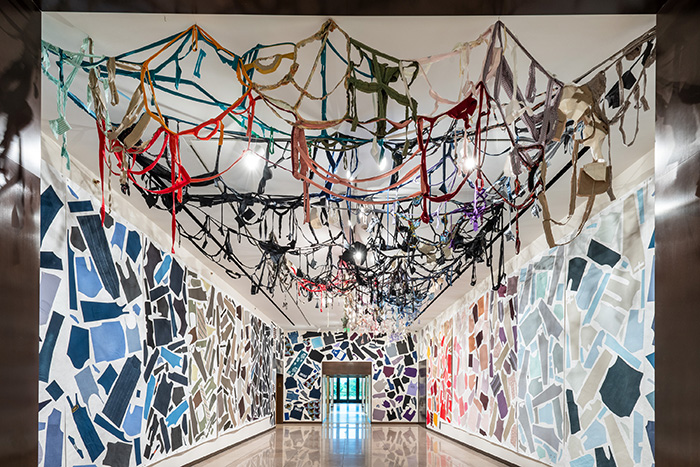
2⁄4
Jean Shin (b. 1971), The Museum Body, 2024, and Cut Outs and Suspended Seams, 2004/2024, cut fabric (clothes from Amon Carter Museum of American Art and Museum of Modern Art employees), thread, adhesive, and Tyvek, Courtesy of the artist, Amon Carter Museum of American Art, Museum of Modern Art, and Praise Shadows Gallery
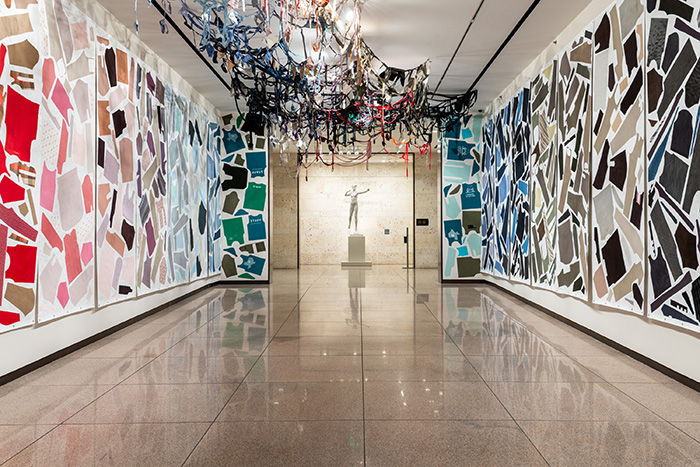
3 ⁄4
Jean Shin (b. 1971), The Museum Body, 2024, and Cut Outs and Suspended Seams, 2004/2024, cut fabric (clothes from Amon Carter Museum of American Art and Museum of Modern Art employees), thread, adhesive, and Tyvek, Courtesy of the artist, Amon Carter Museum of American Art, Museum of Modern Art, and Praise Shadows Gallery
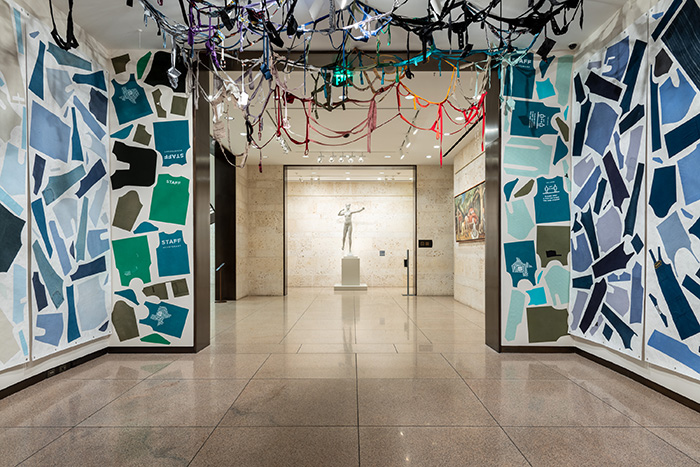
4 ⁄4
Jean Shin (b. 1971), The Museum Body, 2024, and Cut Outs and Suspended Seams, 2004/2024, cut fabric (clothes from Amon Carter Museum of American Art and Museum of Modern Art employees), thread, adhesive, and Tyvek, Courtesy of the artist, Amon Carter Museum of American Art, Museum of Modern Art, and Praise Shadows Gallery
“We’re very intrigued about what these students will say,” Detrick says. “My feeling is that there’s an intergenerational divide in this country,” with young people feeling a “malaise” about their prospects.
“You read about young people, generation Z, and their view of democracy. It’s so low that it doesn’t portend well for the kind of representative democracy we need. I think … there’s genuine concern from young people about how they’re represented.”
Students from HSPVA’s American history and creative writing departments will give their side of things in essays they write this fall, Detrick says. Maroney will take those, craft a libretto from them and set it to music. To give the up-and-coming generation another opening, Apollo will premiere works by the winners of its international commissioning contest.

1 ⁄4
Portrait of Jean Shin, Courtesy the artist and Philadelphia Museum of Art, Photo by Joseph Hu

2⁄4
Jean Shin (b. 1971), The Museum Body, 2024, and Cut Outs and Suspended Seams, 2004/2024, cut fabric (clothes from Amon Carter Museum of American Art and Museum of Modern Art employees), thread, adhesive, and Tyvek, Courtesy of the artist, Amon Carter Museum of American Art, Museum of Modern Art, and Praise Shadows Gallery

3 ⁄4
Jean Shin (b. 1971), The Museum Body, 2024, and Cut Outs and Suspended Seams, 2004/2024, cut fabric (clothes from Amon Carter Museum of American Art and Museum of Modern Art employees), thread, adhesive, and Tyvek, Courtesy of the artist, Amon Carter Museum of American Art, Museum of Modern Art, and Praise Shadows Gallery

4 ⁄4
Jean Shin (b. 1971), The Museum Body, 2024, and Cut Outs and Suspended Seams, 2004/2024, cut fabric (clothes from Amon Carter Museum of American Art and Museum of Modern Art employees), thread, adhesive, and Tyvek, Courtesy of the artist, Amon Carter Museum of American Art, Museum of Modern Art, and Praise Shadows Gallery
As the season unfolds, Apollo will offer its annual Czech Heritage Month concert (Oct. 17) and holiday concert (Dec. 14). It will complete its four-year concert tour of all 26 Harris County Public Library branches—having racked up more than 2,000 miles of driving, Detrick says.
In all its projects, Detrick says, Apollo’s growing repertoire of commissioned works pays constant dividends. Not only are they a musical resource, but they have helped donors bond with the group. And they keep concertgoers interested and engaged.
“Apollo’s in its middle-aged years, if you will,” Detrick says. “We have a lot more of our work to draw on. You don’t have that when you start out. That’s one of the things that has been most special to me. … Our legacy will be our commissions, and hopefully our programming, too. I hope people look at what we do, and are inspired to take some chances.”
-STEVEN BROWN

